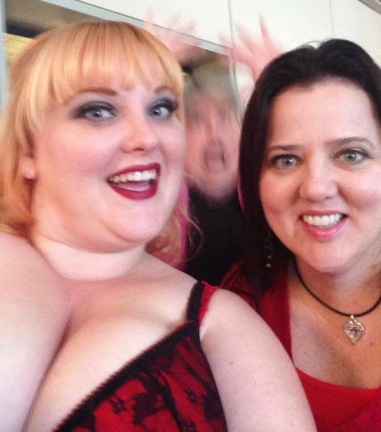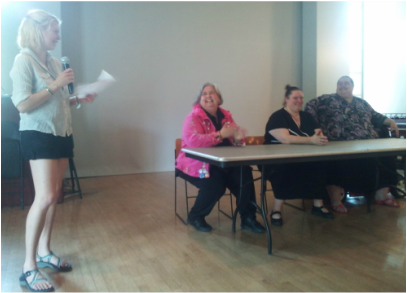When I was four years old, my mother took me to a local Parks & Rec class called Tiny Tots Ballet. That whole first lesson, I couldn't cross the vast, wood-floor auditorium to join the other pre-schoolers learning toe positions from Miss Patti. I sat with mom in the folding chairs along the wall. How did they so readily join in? Unspoken, unnamed concerns kept me in my chair. I imagine it was part shyness and part weight stigma. I knew I was different. I knew that when adults said, "You're getting big!" it wasn't always praise. I knew that dance class was simple fun for other children, not me.
 Photobombing Brittany Marie Oliphant and Celeste Davis.
Photobombing Brittany Marie Oliphant and Celeste Davis. The deep irony of this feeling — of being the outsider — is that nearly everyone has it at some point. One of my favorite joys in fat activism is when the pain of isolation becomes our point of connection and we laugh at the absurdity of it all.
Somehow, I performed in the Tiny Tots recital 10 weeks later. We did the classics: "I'm a Little Teapot" and "Teddy Bear, Teddy Bear, Turn Around." I made a friend who became a playmate. While I'm far from shy as an adult, weight stigma is still pervasive and I'm still finding ways to dance despite it. Researchers have no trouble finding 5-year-olds who say they're feeling weight stigma. It was part of my earliest memories as a mildly chubby (barely not-thin) pre-schooler in 1970.
I hadn't thought about Tiny Tots Ballet in years, until I was reminded of it last weekend at Pitzer College. I was there to speak on a panel about weight diversity. The day's events included a performance by Ragen Chastain and two of the dancers from More Cabaret. They did some fabulous numbers (including Ruth Brown's "If I can't Sell It, I'll Sit on It!") and told stories of the weight stigma they'd encountered in dance:
Somehow, I performed in the Tiny Tots recital 10 weeks later. We did the classics: "I'm a Little Teapot" and "Teddy Bear, Teddy Bear, Turn Around." I made a friend who became a playmate. While I'm far from shy as an adult, weight stigma is still pervasive and I'm still finding ways to dance despite it. Researchers have no trouble finding 5-year-olds who say they're feeling weight stigma. It was part of my earliest memories as a mildly chubby (barely not-thin) pre-schooler in 1970.
I hadn't thought about Tiny Tots Ballet in years, until I was reminded of it last weekend at Pitzer College. I was there to speak on a panel about weight diversity. The day's events included a performance by Ragen Chastain and two of the dancers from More Cabaret. They did some fabulous numbers (including Ruth Brown's "If I can't Sell It, I'll Sit on It!") and told stories of the weight stigma they'd encountered in dance:
- Ragen told the story of a ballroom dance judge who tried to impose a no-spaghetti-straps rule, prompting her realization that being a fat dancer meant being a fat activist.
- Brittany Marie Oliphant talked about always being cast in unromantic roles in musical theater and how she reclaims the power of sexiness and charm now, when she performs burlesque or dances with More Cabaret.
- Alice Fu talked about her childhood ballet classes, the body shaming the teacher did, and her heroic reclaiming of joy in dance, with both More Cabaret and flamenco.

After the dance performance, LA-based fat activist Julianne Wotasick, Ragen, and I did a panel discussion about weight stigma and its connections to other oppressions. I was sad to miss Pia Schiavo-Campo, creator of Chronicles of a Mixed Fat Chick, a panelist who was unable to attend. It was moderated by Zoey Martin-Lockhart, the ambitious student who organized the day's events and invited us to her campus. Presenting with other weight-radical people, rather than as a lone proponent, changes the power dynamic and makes it way more fun. Ragen made great points about healthism and about being in solidarity with people who face all forms of oppression. Julianne gave a brilliant description of her path from self-loathing to liberation and about what it's like to do weight-blaming-free self-care even — and especially — during health and mobility challenges. Of my comments, my favorite moment was the reaction when I asked the audience, "If you can't be at home in your body, where can you go? What if we all felt completely at home in our bodies and welcome in society?"
Glimpse that world during the Fat Flash Mob 2014, organized by Rubenesque Burlesque founder Juicy D. Light, with choreography from EmFATic Dance troupe member Alanna Kelly. It happens on Saturday, May 3, at noon in San Francisco, LA, and other locations. A herd of wild "obesity" researchers couldn't stop me from dancing with this Fat Flash Mob. I'll point my toes a few times, too... for everyone in Miss Patti's class who felt like an outsider.
Glimpse that world during the Fat Flash Mob 2014, organized by Rubenesque Burlesque founder Juicy D. Light, with choreography from EmFATic Dance troupe member Alanna Kelly. It happens on Saturday, May 3, at noon in San Francisco, LA, and other locations. A herd of wild "obesity" researchers couldn't stop me from dancing with this Fat Flash Mob. I'll point my toes a few times, too... for everyone in Miss Patti's class who felt like an outsider.
 RSS Feed
RSS Feed